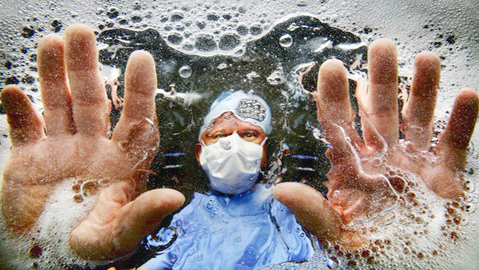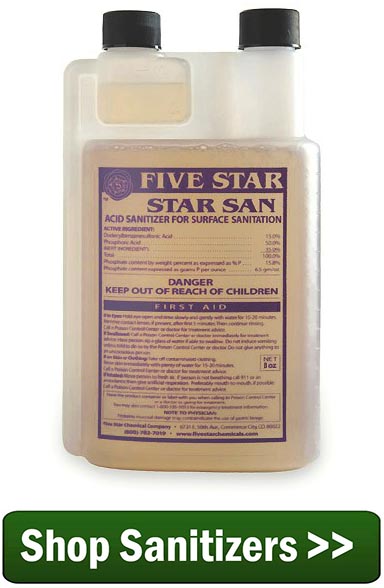 You’ve heard it again and again – cleaning and sanitation are two of the most important aspects of homebrewing. It’s true – lax cleaning and sanitation can easily spoil a batch of homebrew – but there are some things about beer and brewing that inherently prevent spoilage. Knowing what they are can save some time and headache.
You’ve heard it again and again – cleaning and sanitation are two of the most important aspects of homebrewing. It’s true – lax cleaning and sanitation can easily spoil a batch of homebrew – but there are some things about beer and brewing that inherently prevent spoilage. Knowing what they are can save some time and headache.
Now this advice may go against conventional wisdom, but in an effort to save you some stress, here’s a breakdown of when – and when not – to be overly concerned about home brewing sanitation.
When to Be Paranoid About Home Brewing Sanitation
- Yeast handling – Anytime you’re handling yeast is a good time to be concerned about sanitation. In fact, it’s when you should be most paranoid about sanitation. That said, by pitching a large number of yeast cells into a wort, that yeast will likely outcompete any other microorganisms – but there’s no sense in giving those spoiling microbes a leg up. Whenever you’re harvesting yeast or preparing a yeast starter, go the extra mile to make sure that anything that might come in contact with the yeast has been thorough cleaned and sanitized.
- Post boil, post chill – One of the reasons we boil wort is to sanitize it. Maintaining a high temperature effectively sanitizes the wort, giving the beer yeast a clean slate for it to ferment. But once the temperature of the wort drops, it becomes susceptible to wild yeast and bacteria. After the wort has been chilled, everything it touches needs to be thoroughly sanitized: fermenters, airlocks, racking tubing, thermometers, hydrometers. This is why it’s not recommended to return wort used for hydrometer reading back to the main batch.
- Bottling – To continue from the previous point, you don’t want to go through all the hard work of brewing a batch of beer just to put it in a dirty bottle. Make sure all the bottles are extra clean and don’t forget to check the spigot of the bottling bucket.
When NOT to Be Paranoid About Home Brewing Sanitation
- During a normal mash – Clean the mash tun, yes, but you don’t really need to sanitize it. That said, a mash that’s left alone for a long time can go sour. In fact, some brewers use what’s called a sour mash in brewing sour beer. But a normal, 60-90 minute mash will not have enough time to spoil. Of course, it might be a good idea to clean and sanitize your mash tun after the mash to prevent mold growth.
- When boiling – There’s really no need to sanitize your brew kettle. The high temperature of the boil will be more than sufficient for sanitizing.

- When using an immersion wort chiller – There’s no need to sanitize your immersion wort chiller. Make sure it’s clean, yes, but placing it in nearly boiling wort will be plenty hot for sanitizing. Just make sure you clean it well afterwards.
- After fermentation – Once your beer has made it through fermentation, you’re not exactly out of the woods, but your beer is in a much safer place than it was before fermentation. For one, the alcohol content in the beer will protect it from spoilage organisms to some degree. Also, the lower acidity of the beer will inhibit wild bacteria. Plus, the hops have a preservative effect as well. So when checking final gravity readings, for example, it’s still a good idea to clean and sanitize your gear, but don’t stress about sanitation – you’re almost in the clear!
- When dry hopping – One of the most common stress points is when adding dry hops. Shouldn’t they be sanitized before throwing them in the beer? Some brewers do this, but it’s not really necessary. The hops have naturally preservative properties, and as long as they’ve been stored properly, there’s little to know chance that they’ll contaminate your beer.
This isn’t a license to throw good cleaning and sanitation habits out the window. You’re certainly better off going overboard than missing a spot and spoiling a batch. But in terms of being paranoid about sanitizing, simply make sure your yeast are the only ones fermenting your beer. That’s what home brewing sanitation is all about. Then all you have to do is relax, don’t worry, and have a homebrew!
—–
David Ackley is a writer, brewer, and craft beer marketing consultant. He holds a General Certificate in Brewing from the Institute of Brewing and Distilling and is founder of the Local Beer Blog.
